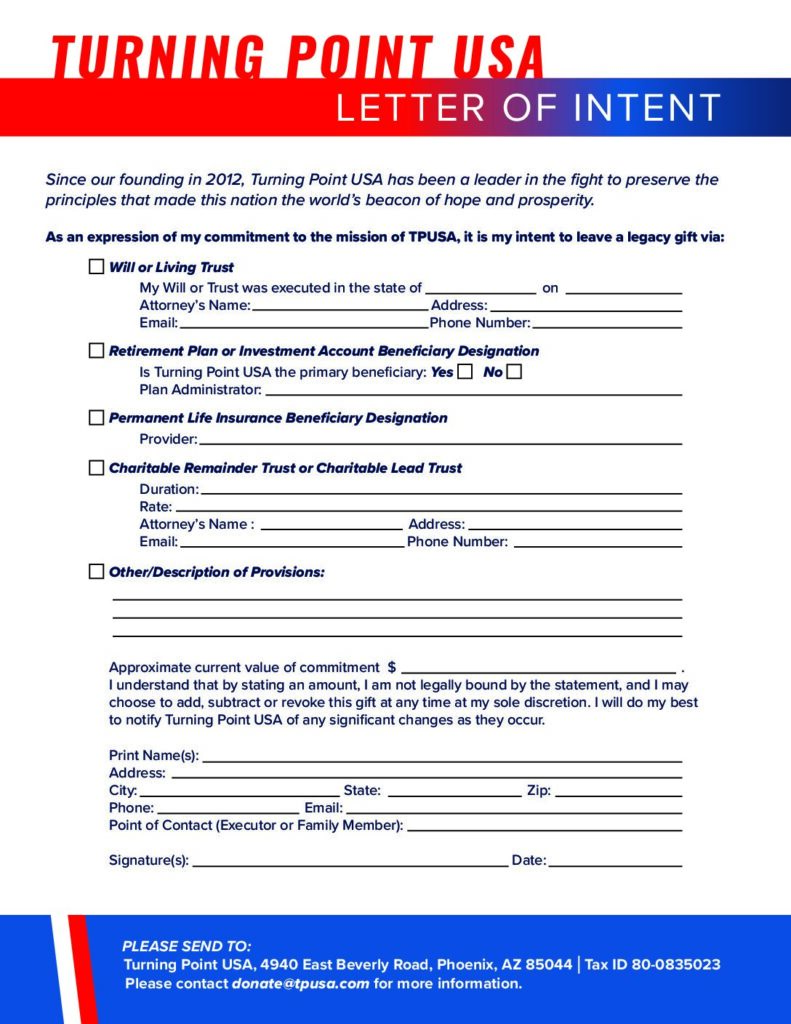As America’s Founding Fathers knew, the fight for freedom is not easily secured. As President Reagan said, “Freedom is a fragile thing and it’s never more than one generation away from extinction. It is not ours by way of inheritance; it must be fought for and defended constantly by each generation, for it comes only once to a people.” I invite you to consider a personal legacy of freedom and patriotism by becoming a member of the Turning Point USA Legacy Society. When you join the TPUSA Legacy Society by including us in your estate plans, you join us in this fight for the future of America and the preservation of her founding principles. Because liberty is never easily won, your legacy gift fortifies TPUSA’s mission and educational outreach that inspire millions of Americans every year.
HOW CAN I BECOME A MEMBER OF THE TPUSA LEGACY SOCIETY?
There are many ways you can become a member of the TPUSA Legacy Society. Some options for including Turning Point in your estate plans include:
- Wills, Bequests, and Real Assets
- Wills are by far the most common vehicle for facilitating an estate gift, primarily through the use of a written and specific bequest. A bequest may be just a single line in a will or estate plan, designating to a named nonprofit(s), a fixed gift amount, a specific asset, and/or a fixed percentage of the estate’s residual value. Named assets include almost anything, most commonly homes, vehicles, stock, and valuables. Additionally, bequests can be used to designate specific IRA/bank accounts or life insurance to be given to a named nonprofit. Bequests are revocable and wills can be easily changed. Although changes are rarely made, this means that you can change your will to include or exclude a beneficiary at any time without legal penalty.
- Retirement Accounts
- Retirement accounts are a great choice for leaving a philanthropic legacy. When left to heirs, retirement accounts are double-taxed: first, they are subject to estate tax, then heirs are subject to an ordinary income tax on what’s left. If retirement accounts are left to nonprofit charities, they are NOT taxed. Nonprofits can be named as beneficiaries through an account administrator or through a will.
- Life Insurance
- When not left to your spouse or a tax-exempt entity, life insurance policies are generally subject to an estate tax. Therefore, when a life insurance policy is no longer needed as an income security vehicle, they can be a good option for leaving a philanthropic legacy. Nonprofits can be named as direct beneficiaries of policies.
- Charitable Trusts
- A charitable gift annuity functions exactly like any other annuity: it provides a guaranteed, fixed payout each year to a beneficiary for the remainder of a donor’s life based on that beneficiary’s age in exchange for a lump sum up-front payout to the nonprofit organization. Most advantageous for persons aged 65 or over and in amounts of at least $25,000, gift annuities are easy, convenient, and reliable, for a few reasons:
- They can generate a current tax deduction and shield assets from an estate tax, they can generate income from appreciated assets while deferring capital gains tax, and they can serve as a contract between you and a charity; no separate trust is required.
- A charitable gift annuity functions exactly like any other annuity: it provides a guaranteed, fixed payout each year to a beneficiary for the remainder of a donor’s life based on that beneficiary’s age in exchange for a lump sum up-front payout to the nonprofit organization. Most advantageous for persons aged 65 or over and in amounts of at least $25,000, gift annuities are easy, convenient, and reliable, for a few reasons:
- Charitable Lead Trusts
- There are several types of trusts—and the choice of which one to set up will depend chiefly on the needs of the donor to provide for other beneficiaries and the type of income the donor is trying to shield from taxes. All charitable trusts are irrevocable. Check with your lawyer or financial advisor to determine if a Charitable Lead Trust or a Charitable Remainder Trust is right for you.
- Donor Advised Funds (DAFs)
- Donor Advised Funds (DAFs) are a popular means for managing legacy giving and annual donations. A DAF is set up primarily for giving to multiple nonprofits during a supporter’s life. However, when setting up the DAF the donor often has the option to designate one or more nonprofits to receive funds from the account in the event of his or her demise. DAFs can provide donors with expert advice and various options for giving, all while ensuring that anonymity, if one wishes, is preserved. Donors can name a DAF as a single charitable beneficiary while working with the DAF to make distributions to multiple designated nonprofits. DAFs can make distributions all at once or spread them out over a specified period of years.
- Stocks and IRA RMDs
- Individual retirement accounts (IRAs) require that certain percentages of the account’s assets be distributed each year starting at age 72. This is called the Required Minimum Distribution (RMD). Donors can give up to $100,000 to nonprofits of their choice each year, which counts toward their RMD is not considered taxable income for the donor. TPUSA recommends speaking with a lawyer or financial advisor to decide if RMDs are right for your charitable giving strategy.
BENEFITS OF MEMBERSHIP
In addition to uniting your personal legacy to Turning Point USA and the cause of freedom in America, Legacy Society members also enjoy a number of benefits in appreciation for their generosity to Turning Point USA:
- Personal invitation to meet with CEO Charlie Kirk
- Legacy Society Lapel Pin
- Executive access to all TPUSA national conferences

